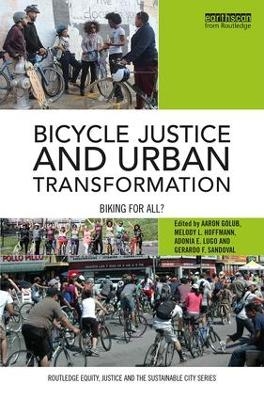
Bicycle Justice and Urban Transformation
Routledge (Verlag)
978-1-138-95024-5 (ISBN)
As bicycle commuting grows in the United States, the profile of the white, middle-class cyclist has emerged. This stereotype evolves just as investments in cycling play an increasingly important role in neighborhood transformations. However, despite stereotypes, the cycling public is actually quite diverse, with the greatest share falling into the lowest income categories.
Bicycle Justice and Urban Transformation demonstrates that for those with privilege, bicycling can be liberatory, a lifestyle choice, whereas for those surviving at the margins, cycling is not a choice, but an often oppressive necessity. Ignoring these "invisible" cyclists skews bicycle improvements towards those with choices. This book argues that it is vital to contextualize bicycling within a broader social justice framework if investments are to serve all street users equitably. "Bicycle justice" is an inclusionary social movement based on furthering material equity and the recognition that qualitative differences matter.
This book illustrates equitable bicycle advocacy, policy and planning. In synthesizing the projects of critical cultural studies, transportation justice and planning, the book reveals the relevance of social justice to public and community-driven investments in cycling. This book will interest professionals, advocates, academics and students in the fields of transportation planning, urban planning, community development, urban geography, sociology and policy.
Aaron Golub is Associate Professor in the Nohad A. Toulan School of Urban Studies and Planning at Portland State University, Oregon, USA. Melody L. Hoffmann is a mass communication instructor at Anoka Ramsey Community College near Minneapolis, Minnesota, USA. Adonia E. Lugo is an urban anthropologist and co-founder of the Bicicultures network, USA. Gerardo F. Sandoval is Associate Professor at the Department of Planning, Public Policy and Management and the Co-Director of the Center for Latino/a and Latin American Studies at the University of Oregon, USA.
1. Introduction: Creating an Inclusionary Bicycle Justice Movement 2. Is the right to bicycle a civil right? Synergies and tensions between the transportation justice movement and planning for bicycling 3. Is Portland’s Bicycle Success Story a Celebration of Gentrification? A theoretical and statistical analysis of bicycle use and demographic change 4. Freedom of movement / Freedom of choice: An enquiry into utility cycling and social justice in post-apartheid Cape Town, 1994-2015 5. Advocating Through Data: Community Visibilities in Crowdsourced Cycling Data 6. Advancing discussions of cycling interventions based on social justice 7. Theorizing Bicycle Justice Using Social Psychology: Examining the Intersection of Mode and Race with the Conceptual Model of Roadway Interactions 8. Delivering (in)Justice: Food Delivery Cyclists in New York City 9. Rascuache Cycling Justice 10. No Choice But to Bike: Undocumented and bike-dependent in rust belt America 11. Aburrido! Cycling on the U.S./Mexican Border with Doble Rueda Bicycle Collective in Matamoros, Tamaulipas 12. Civil Bikes: Embracing Atlanta’s racialized history through bicycle tours 13. Decentering Whiteness in Organized Bicycling: Notes from Inside 14. Community Bicycle Workshops and "Invisible Cyclists" in Brussels 15. Community Disengagement: The Greatest Barrier to Equitable Bike Share 16. No Hay Peor Lucha Que La Que No Se Hace: Re-negotiating cycling in a Latino community 17. Collectively Subverting the Status Quo at the Youth Bike Summit 18. Mediating the ‘White Lanes of Gentrification’ in Humboldt Park: Community-Led economic development and the struggle over public space
| Reihe/Serie | Routledge Equity, Justice and the Sustainable City series |
|---|---|
| Zusatzinfo | 8 Line drawings, black and white; 25 Halftones, black and white; 33 Illustrations, black and white |
| Verlagsort | London |
| Sprache | englisch |
| Maße | 156 x 234 mm |
| Gewicht | 544 g |
| Themenwelt | Naturwissenschaften ► Geowissenschaften ► Geografie / Kartografie |
| Sozialwissenschaften ► Politik / Verwaltung | |
| Sozialwissenschaften ► Soziologie | |
| Technik ► Umwelttechnik / Biotechnologie | |
| Wirtschaft ► Volkswirtschaftslehre | |
| ISBN-10 | 1-138-95024-6 / 1138950246 |
| ISBN-13 | 978-1-138-95024-5 / 9781138950245 |
| Zustand | Neuware |
| Haben Sie eine Frage zum Produkt? |
aus dem Bereich


